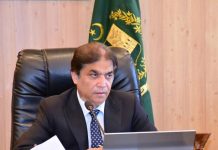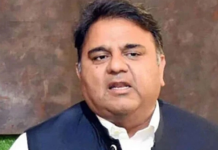ISLAMABAD: Former, Chairman Joint Chiefs of Staff Committee, General (R) Ehsan Ul Haq on Thursday said Pakistan must revisit its policy options and try to explore new dimensions of interacting more independently at the foreign policy level.
He was addressing a distinguished lecture on the theme, “Emerging global realities: impact on regional politics and security dynamics in South Asia,” at Islamabad Policy Research Institute (IPRI) here, a news release said.
General (R) Ehsan said that regional dynamic were in a state of flux, and new realities were posing a challenge. “Pakistan’s strategic position is a source of strength and brings with it challenges, too,” he noted.
He foresaw a new order in the making, and said that China is assuming a critical role in the region and beyond.
He, however, said that the special understanding and strategic collaboration with Beijing is not up for a debate or review. He said that relations with the United States and China should be independent of their bilateralism, and ruled out the option of playing the role of an arbitrator between the two great powers.
He said that new dimensions and the growth of China has blessed it with more avenues for reaching out to Washington for a ‘thaw.’
The former Chairman Joint Chiefs of Staff Committee underscored the need for ‘putting the house in order,’ and observed that change of government in 2022 came at a time when the world was coming out of pandemic, and Russo-Ukraine conflict was in the making. He noted that “prudence” was missing at that moment, and the last two years unrest domestically was in need of a solution.
To a question, Gen Ehsan said that he was optimistic and hoped that India-Pakistan relations would improve. He said a lot of undercurrents would compel the third Narendra Modi dispensation to arrive at a consensus of dealing with Pakistan.
He made it clear that India’s hegemonic mindset is behind the mistrust and jingoism, and is costing the region in terms of peace and security.
He remarked that the status quo is fracturing, and the world is inching towards multipolarity.
“A re-emerging Russia is a reality, and Pakistan must explore good relations with it,” he said. He observed that why should Pakistan be the lone man out, when all other states were dealing with Moscow in oil, energy and economic terms.
He also pointed out that the war in Ukraine has changed the American perspective for good, and now it believes that there was no room for dealing with President Putin, and Russia was a difficult state to deal with.
He said that it was a stated policy of the US to contain China, and the proactive Indo-Pacific strategy, AUKUS and QUAD as well as the National Security Doctrine were cases in point.
“The US characterizes China as a threat and wants to curb its influence in technology and economic terms,” Gen Ehsan opined.
He said even the Western allies are now looking at China for economic incentives, and noted that “geo-economics, technology and population” are tools of change.
He made it a point that the idea of an ambitious cor ridor at G20 Summit from Europe to India via the Middle East ignored the grim r ealities of simmering conflicts and economic revulsion. –Agencies





